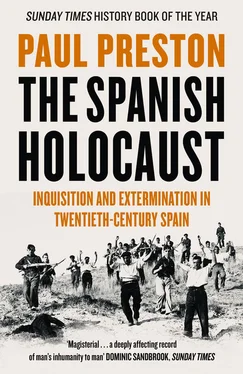Coming just before the harvest was due to start, this allowed the owners to bring in Portuguese and Galician labour to undercut the wages of local workers who already faced starvation. The last vestige of protection that left-wing landless labourers had for their jobs and their wages was that provided by the Socialist majorities on many town and village councils. Socialist mayors were the only hope that rural workers had of landowners being obliged to observe social legislation or of municipal funds being used for public works to provide some employment. When the Radicals came into power in late 1933, Lerroux’s first Minister of the Interior, Manuel Rico Avello, removed thirty-five of them. Salazar Alonso began to remove many more, usually on flimsy pretexts such as ‘administrative irregularities’ – which often referred to debts inherited from their monarchist predecessors. As soon as he took up office, in response to petitions from local caciques, he ordered provincial civil governors to remove mayors who ‘did not inspire confidence in matters of public order’ – which usually meant Socialists. The legally elected mayor would then be replaced by a ‘government delegate’, usually a local conservative nominee.
Some of Salazar Alonso’s most drastic interventions were in Extremadura, which was partly explained by his infatuation with the local aristocracy. In his memoirs, he admitted removing 193 southern town councils over the next six months. The procedure was that, after a denunciation of some irregularity, however small or implausible, a ‘delegate’ of the Civil Governor, accompanied by the Civil Guard and representatives of the local right, would expel the Socialist mayor and councillors. The majority of the ‘delegates’ were either caciques or their appointees. The idea was to put an end to a situation in which Socialist councils endeavoured to ensure the implementation of social legislation, particularly work-sharing. Once the change had taken place, the new mayors did nothing to protect workers, either from the capricious employment policies of the caciques or from the attacks of their retainers and the Civil Guard. 42
Two significant cases of the removal of popular mayors in the province of Badajoz were those of José González Barrero of Zafra and Modesto José Lorenzana Macarro of Fuente de Cantos. González Barrero was a moderate Socialist, respected even by local conservatives because he owned a local hotel and served at Mass. He was widely regarded as an efficient and tolerant Mayor. However, Salazar Alonso, who well remembered their clash at Hornachos some months earlier, was determined to have him removed. Within ten days of his own appointment as Minister of the Interior, he had sent as inspector to Zafra one of his cronies, Regino Valencia, who predictably elaborated a series of charges to justify the suspension of González Barrero. The most serious was that improper methods had been used to raise funds for a road-building scheme to create work for the local unemployed. While in Zafra, Regino Valencia had admitted that the charges were flimsy and that he had been pressured by Salazar Alonso to come up with the required findings or else lose his job. The consequence was that, on 26 May 1934, the entire town council was removed and replaced by another, hand-picked and unelected. Its composition revealed the close links between the Radical Party and the landholding elite in the province. The new Mayor was an ex-member of Primo de Rivera’s Unión Patriótica and looked after the considerable interests in Zafra of the Duque de Medinaceli. 43
In Fuente de Cantos, the Socialist Mayor, Modesto José Lorenzana Macarro, was known for his humanity and for the efforts that he made to improve the town, particularly in terms of water supplies. He had used municipal funds to buy food to alleviate the hunger of the families of the unemployed. In June 1934, he was removed on the grounds of misuse of these funds. 44As both cases showed, the intention was to diminish the protection afforded to the landless poor by Socialist town councils. The shameless illegality by which the democratic process was ignored, and the long-term consequences of giving the landowners free rein, massively intensified the festering social hatred in the southern countryside. José Lorenzana was to be murdered in September 1936. José González Barrero would be murdered in April 1939.
With tension in the countryside growing by the day, the right in most provinces used every means possible to pressurize the Civil Governor. In the provincial capitals, right-wingers, well dressed and well spoken, were able to honour the governor with lunches and dinners and, with the press on their side, were able to muster considerable influence. When that influence was converted into official acquiescence in the slashing of wages and discrimination against union labour, hungry labourers were reduced to stealing olives and other crops. Landowners and their representatives then complained loudly about anarchy in the countryside to justify the intervention of the Civil Guard. Even El Debate commented on the harshness of many landlords while still demanding that jobs be given only to affiliates of the Catholic unions which had emerged in the wake of the elections. To meet the twin objectives of cheap labour and the demobilization of left-wing unions, Acción Popular created Acción Obrerista in many southern towns. It was a right-wing association backed by the local owners which was thus able to hand out jobs, at well below the wage levels agreed in the wage agreements, to those prepared to renounce membership of the Socialist FNTT. 45
The result was an intensification of hardship and hatred. In Badajoz, starving labourers were begging in the streets of the towns. Rickets and tuberculosis were common. The monarchist expert on agrarian matters, the Vizconde de Eza, said that in May 1934 over 150,000 families lacked even the bare necessities of life. Workers who refused to rip up their union cards were denied work. The owners’ boycott of unionized labour was designed to reassert pre-1931 forms of social control and to ensure that the Republican–Socialist challenge to the system should never be repeated. In villages like Hornachos, this determination had been revealed by physical assaults on the Casa del Pueblo. A typical incident took place at Puebla de Don Fadrique, near Huéscar in the province of Granada. The Socialist Mayor was replaced by a retired army officer who was determined to put an end to what he saw as the workers’ indiscipline. He surrounded the Casa del Pueblo with a detachment of Civil Guard, and as the workers filed out they were beaten by the Guards and by retainers of the local owners. 46
The response of the FNTT was an illuminating example of how the newly revolutionized Socialists were reacting to increased aggression from the employers. The FNTT newspaper, El Obrero de la Tierra, had adopted a revolutionary line after the removal on 28 January 1934 of the union’s moderate executive. The paper asserted that the only solution to the misery of the rural working class was the socialization of the land. In the meantime, however, the new executive adopted practical policies every bit as conciliatory as those of their predecessors. The FNTT sent to the Ministers of Labour, Agriculture and the Interior a series of reasoned appeals for the application of the law regarding obligatory cultivation, work agreements, strict job rotation and labour exchanges, as well as protests at the systematic closures of the Casas del Pueblo. That was in the third week of March. When no response was received, and, indeed, the persecution of left-wing workers began to increase prior to the harvest, a respectful appeal was made to Alcalá Zamora – also to no avail. The FNTT declared that thousands were slowly dying of hunger and published long, detailed lists of villages where union members were being refused work and physically attacked. In the province of Badajoz, the FNTT calculated that there were 20,000 workers unemployed and that they and their families were dying of starvation. There were five hundred union members in prison. 47
Читать дальше












